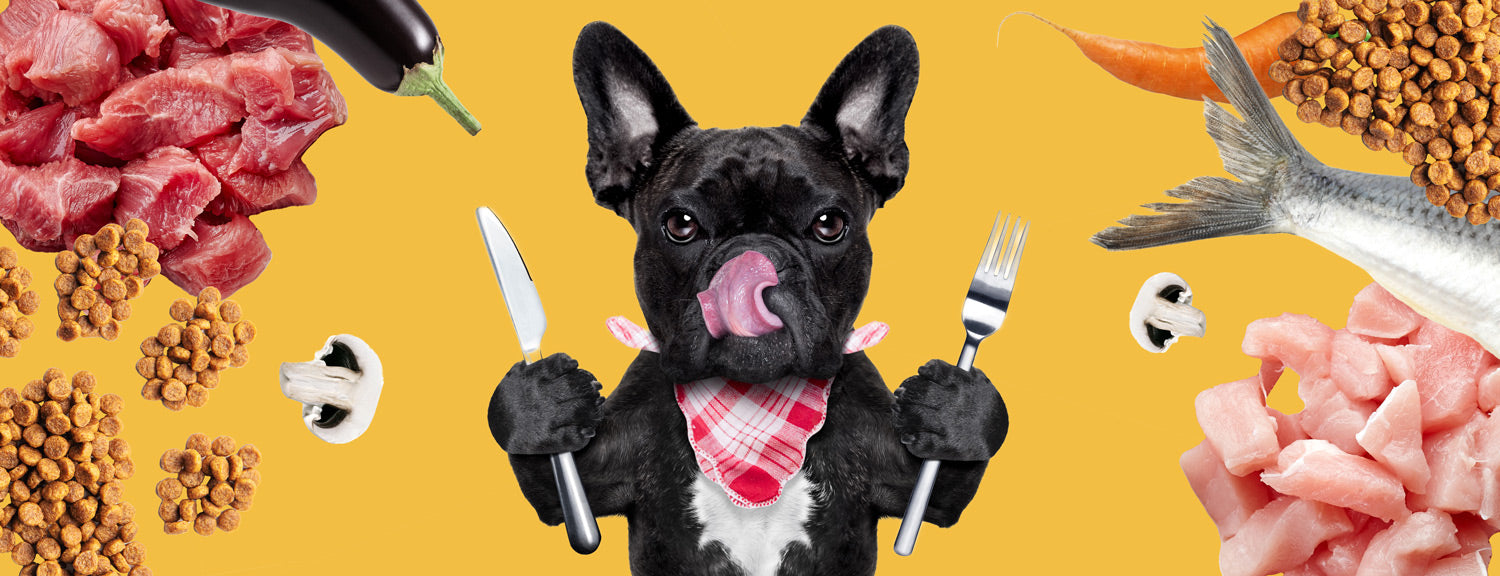Your basket is empty

The Hidden Dangers of Rawhide Treats for Dogs
October 11, 2023 4 min read
The seemingly innocuous rawhide treats, frequently found on the shelves of our local pet shops, may be far from the benign chew many dog owners imagine. The reality is, these treats come with a myriad of potential dangers that could threaten our beloved dogs' health. This article explores what rawhide treats truly comprise, the intricate manufacturing process, the reasons behind their persistent market presence, the risks they pose, and healthier, safer alternatives for your canine companion.
What are rawhide treats?
Rawhide treats, commonly known as "rawhides," are dog chews crafted predominantly from the inner layer of cow or horse hides. Their durability, coupled with their attractiveness to dogs, has cemented their popularity among many British dog owners. Appearing in various shapes and sizes, these chews are often used as a tool to alleviate a dog's chewing urges or to support dental hygiene. But while they may seem like a harmless treat on the surface, the processes and materials that go into their production have raised concerns among veterinarians and pet nutritionists alike. Not only are there questions about their digestibility, but there are also pressing concerns about potential toxins and contaminants present in these treats, stemming from their complex production process.
***
Manufacturing process
Rawhide treats come to life through a multi-step process that, rather alarmingly, involves a range of potent chemicals. The initial source of these treats is the residual products from the leather industry. The majority of hides are sourced directly from slaughterhouse kill floors and subsequently immersed in high-salt brines to decelerate their decomposition. With a significant portion of rawhide treats being produced in China, it can span several weeks to even months for these salt-soaked hides to reach tanneries for final processing.
Upon arrival at a tannery, the hide undergoes soaking and is treated with lime to separate the fatty layer from the skin. The hair is then eradicated through a combination of chemicals and physical methods, followed by another round of rinsing. However, it's vital to understand that no matter how much these salt brines delay the inevitable, they can't entirely prevent the decay of the hide.
***
Why are they still on our shelves?
Despite the numerous concerns surrounding rawhide treats, they continue to maintain a strong presence in pet shops and supermarkets throughout the UK. Several factors contribute to their ongoing availability:
Economic incentives – Rawhides are a profitable product. Their manufacturing process utilises by-products of the leather industry, turning what might be considered waste into a sellable commodity. This efficient use of resources makes rawhides cost-effective to produce and, when coupled with their popularity among dog owners, the demand keeps them on store shelves.
Lack of awareness – Many consumers remain unaware of the potential dangers and origins of rawhide treats. Without this knowledge, there's little impetus for dog owners to look for alternatives. Bright packaging, marketing tactics, and their prevalent availability can give the impression of them being both safe and beneficial.
Regulatory gaps – While there are regulations in place for pet foods, the criteria and strictness of guidelines can vary for dog treats. This disparity can sometimes result in products of questionable quality or safety making their way to the market.
Veterinary divisions – While many veterinarians advise against rawhide treats due to the associated risks, others believe they can be consumed safely if managed properly. This split in professional opinion can send mixed messages to dog owners.
Ingrained habits – For many, giving rawhide treats has become an ingrained habit, passed down from one generation of dog owners to the next. Unless a pet faces a direct issue traced back to rawhides, some owners might see no reason to change their practices.
***
The risks of rawhide treats
Choking or blockage– As dogs chew, rawhide treats can become slippery, posing serious choking or digestive blockage threats. Large pieces of rawhide can break off and become lodged in a dog's oesophagus or intestines, which might require surgical intervention.
Digestive complications – Some dogs might suffer from digestive upset, diarrhoea, or vomiting, stemming from rawhide digestion challenges or additive reactions.
Contamination concerns – The potential for contamination with harmful bacteria, such as E. Coli or Salmonella, poses threats to both pets and their owners.
Chemicals– During the manufacturing process, rawhides may be treated with harmful chemicals. Over time, consuming these chemicals could be harmful to dogs.
Allergic reactions – Artificial colourings and flavourings might trigger allergies in some dogs, manifesting as skin or digestive issues.
***
Safer, healthier alternatives
Given the risks tied to rawhide, seeking safer alternatives is essential for conscientious pet owners:
Vegetable-based chews – Opt for chews derived from vegetables like sweet potatoes, which offer easier digestion.
Recreational bones – Under supervision, provide natural bones suited to your dog's size, ensuring a safe chewing experience. Never give cooked or smoked bones as they can splinter and cause harm.
Rubber chew toys – Durable rubber toys such as Kongs that are specifically designed for chewing can meet your dog's chew needs without the ingestion danger.
Freeze-dried snacks – Delve into freeze-dried treats, typically comprising pure meat, for a tasty and safe treat.
Natural long-lasting treats– Natural treats such as bully sticks, camel braids, pork rolls are fully digestible and don't pose the same blockage risk as rawhides.
***
Conclusion
While rawhide treats have been a go-to for dog owners for years, the potential risks associated with them warrant a closer look. Embracing alternative products that prioritise your dog's health and safety is of utmost importance. Always lean towards products transparent about their ingredients and production processes, and should uncertainties arise, always consult your vet to ensure you're making the best choices for your furry mate.
Guarding our dogs' health starts with making informed choices. Let's opt for treats that genuinely treat them well!
Also in Pet Advice

Take your dog's kibble to the next level
November 18, 2024 4 min read
For decades, dog owners have been conditioned to believe that dry kibble is a complete, balanced solution for our dogs. Convenient? Absolutely. But sufficient? Not quite...
Read More
How can I make walks with my dog more interesting?
September 20, 2024 4 min read
By changing up the type of walk you take, you can engage your dog’s body and mind in new ways, making each outing more fun and enriching. Whether it's letting them follow their nose, burning off some extra energy, or sharpening their training skills, different walks serve different purposes...
Read More
Everything you need to know about turmeric's health benefits for your dog
August 25, 2024 5 min read
With extensive research backing its therapeutic properties, turmeric may offer a range of benefits for your dog, from reducing inflammation to supporting joint health...
Read More